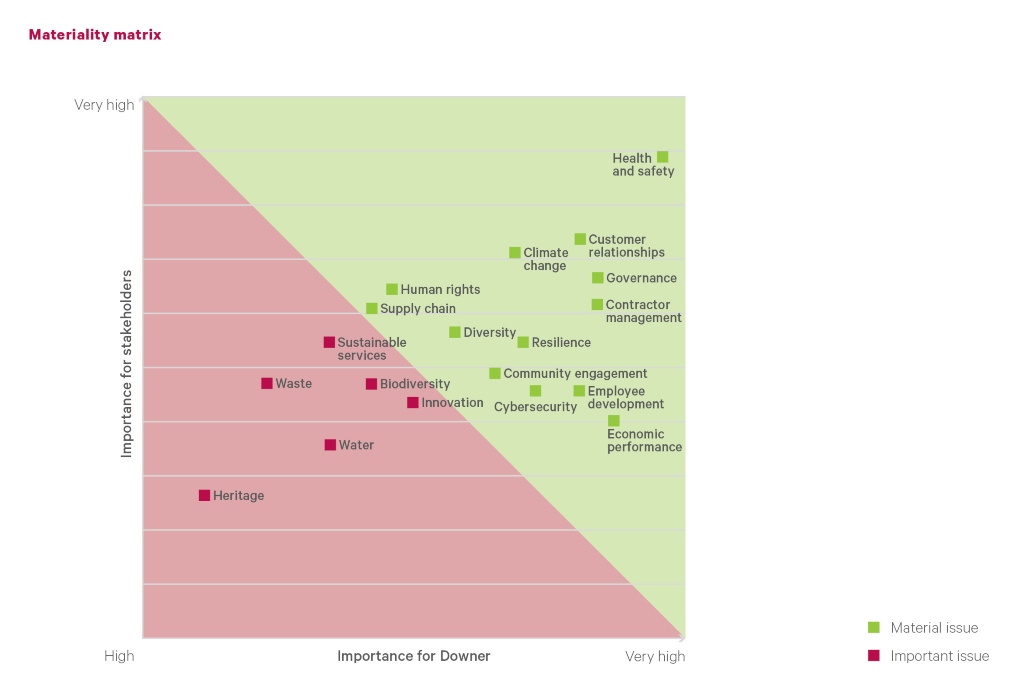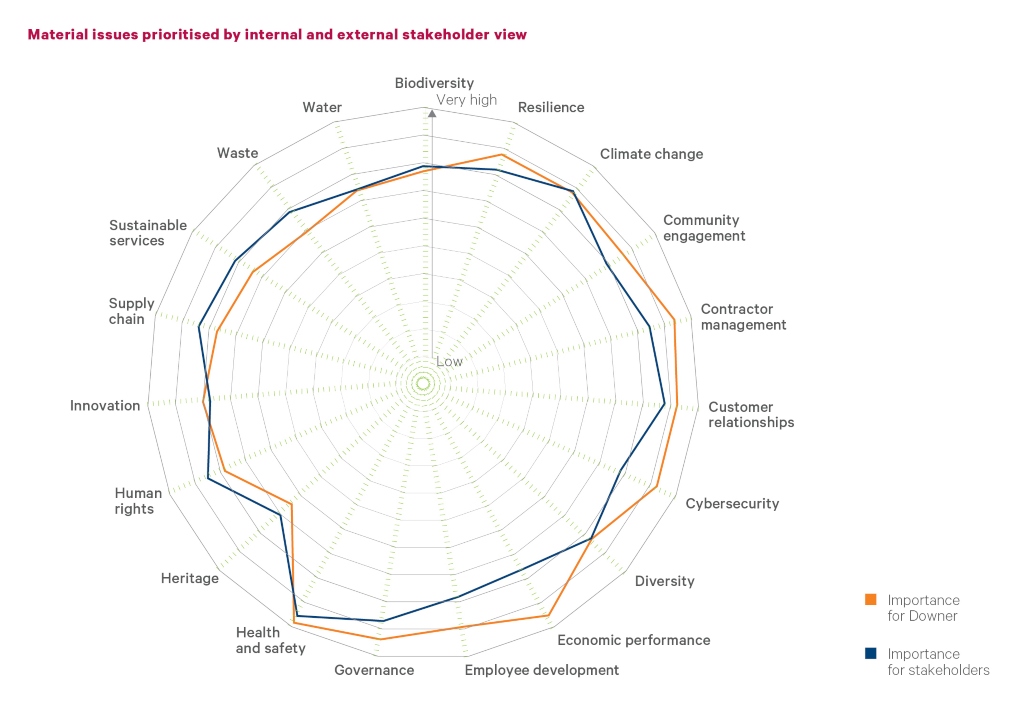Our approach
Our stakeholders
Downer recognises that our business operations have a direct impact on a wide range of stakeholders.
Downer believes that issues which are important to our stakeholders should also be important focus areas for Downer in order to meet our strategic objectives and fulfil our Purpose. This requires ongoing and effective engagement with our stakeholders, where we provide transparent and timely information and actively encourage feedback. We utilise the following initiatives to promote open, two-way communication between Downer and our stakeholders.
|
How we engage with our external stakeholders | ||
|---|---|---|
|
Stakeholder |
Upstream/Downstream* |
How we engage |
|
Customers |
Downstream |
Project/contract-specific surveys, strategic customer reviews, multicustomer survey programs, tender debrief sessions, informal feedback and social media channels |
|
Communities |
Downstream |
Project specific community engagement plans, local media, social media channels, employment opportunities, local supply arrangements, community investment projects, sponsorships and donations |
|
Investors and shareholder community |
Downstream and Upstream |
ASX releases, Half Year and Full Year results presentations and webcasts, Investor Day (annually), Annual General Meeting, Annual Report, Sustainability Report, regular meetings and social media channels (ongoing) |
|
Business partners |
Upstream |
Joint venture boards and operating committees, meetings, workshops |
|
Suppliers |
Upstream |
Prequalification, tender contract documents, inductions and training, meetings, contractor engagement |
|
Government regulators |
Upstream |
Reports, meetings and working groups |
|
Trade unions |
Upstream |
Meetings |
|
Industry associations |
Upstream |
Representation on boards and committees, meetings and working groups |
|
Media |
Upstream |
Media/ASX releases, briefings and interviews, websites, social media channels |
|
Non-Government Organisations (NGOs) |
Upstream |
Participation in forums, meetings |
*Upstream stakeholders – comprises stakeholders who either directly or indirectly influence Downer's success.
*Downstream stakeholders – comprises the paying customers and end-users of Downer’s products and services.
Material issues
Downer conducted a comprehensive materiality assessment in 2021.
The materiality assessment identified a prioritised list of 13 material issues (see table below), as well as the top eight Sustainable Development Goals that Downer contributes to. The material issues are addressed within the relevant sections of this Sustainability Report, except for economic performance. This is referenced within the context of the Sustainability Report but addressed in more detail in Downer’s Annual Report.
|
Material issues by ranking |
|
Definition |
|
Issue relevance to broader value chain |
|
Relevant Sustainable Development Goal |
|
Section |
|---|---|---|---|---|---|---|---|---|
| 1. Health, safety and wellbeing |
Maintaining a strong and committed Zero Harm culture. This includes managing safety risks and supporting the mental and physical health of our people and our partners. | Subcontractors, suppliers, customers, communities, JVs and alliances, regulators. | Good health and wellbeing | Health and safety | ||||
| 2. Governance and ethical conduct | Maintaining a robust governance framework that rewards high ethical standards and personal integrity. This includes committing to transparency for all our stakeholders. | Investors, regulators, customers, subcontractors, suppliers, JVs and alliances. | Governance and ethical conduct | |||||
| 3. Economic performance | Demonstrating economic strength and resilience, and strong operational performance. This includes achieving low risk, predictable revenue and cash flow through a capital light, services-based business model. | Investors, subcontractors, suppliers, customers, JVs and alliances. | Decent work and economic growth | Downer's Annual Report | ||||
| 4. Customer relationships | Keeping pace with customer expectations via engagement and feedback to ensure we improve the value and services we provide to both our customers and their customers. | Customers, investors, subcontractors, suppliers, JVs and alliances. | ||||||
| 5. Contractor management | Ensuring that contractors know their obligations, and are engaged and aligned to Downer’s values in managing risk. This includes adherence to Downer’s Standards of Business Conduct and The Downer Standard including Downer’s health, safety and environmental policies which govern how we perform work to meet our customers’ expectations. | Subcontractors, JVs, alliances and customers. | Decent work and economic growth | |||||
| 6. Climate change | Minimising Downer’s contribution to the harmful effects of climate change. This includes reducing Downer’s greenhouse gas emissions, as well as those of our supply chain. Improving the resilience of our assets and portfolio and capitalising on climate-related opportunities. | Investors, regulators, subcontractors, suppliers, customers, communities, JVs and alliances | Climate action | Environment | ||||
| 7. Cybersecurity | Protecting the information of our operations and our partnerships. This includes implementing policies and infrastructure to safeguard data while minimising disruptions. | Investors, subcontractors,suppliers, customers, JVs and alliances | Governance and ethical conduct | |||||
| 8. Business resilience | Managing and withstanding extraordinary events such as natural disasters, abrupt shifts in consumer demand or pandemics. This relies on the organisation’s strategy to minimise impact and disruption as a result of these extraordinary events | Investors,subcontractors,suppliers, customers, communities, JVs and alliances, regulators. |
|
|
||||
|
9. Employee development and engagement |
Attracting and retaining a skilled and engaged workforce to be an employer of choice. This includes providing career development opportunities, market competitive employee benefits and avenues for engagement and feedback. |
Subcontrators, JVs, alliances and communities |
Gender equality |
|||||
|
10. Diversity and inclusion |
Fostering a diverse and inclusive workplace that facilitates opportunity and respect. This includes focusing on gender, cultural and generational inclusiveness to reduce inequalities. |
|
Subcontrators, JVs, alliances, customers and communities |
Gender equality |
||||
|
11. Community engagement, impact and development |
Supporting the success of communities in which we operate. This includes fostering partnerships to aid in developing local communities, minimising negative impacts and leaving a positive legacy. |
|
Investors, subcontractors, suppliers, customers, communities, JVs and alliances. |
Sustainable cities and communities |
||||
| 12. Human rights (including modern slavery) | Protecting the fundamental human rights of our people, and people working across our value chain, inclusive of modern slavery. Human rights are the basic standards of treatment to which everyone is entitled, regardless of gender, race, nationality, economic status or religion. | Investors, customers, subcontractors, suppliers, communities, partners. | Decent work and economic growth | Governance and ethical conduct | ||||
| 13. Supply chain management | Engaging with our supply chain to maintain responsible sourcing. This involves having environmental, social and governance frameworks and criteria built into prequalification and supplier agreements, to ensure accountability across the supply chain. This also includes increasing spend with social enterprises where feasible. | Investors, customers, partners, subcontractors, suppliers. | Responsible consumption and production |
Important issues
The materiality assessment also identified six important issues: Innovation and technology; Biodiversity; Sustainable products and services; Water management; Waste management; and Heritage management.
While these six issues were not deemed material to Downer, they remain important to Downer and our stakeholders, with many forming part of our business strategy and contributing to Downer’s performance.


|
Import issues by ranking |
|
Definition |
|---|---|---|
|
14. Innovation and technology |
Driving innovation through the application of technology. This includes adapting and utilising existing technology while identifying opportunities for new technology to increase efficiency and market competitiveness. |
|
|
15. Biodiversity and land management |
Protecting the land and ecosystem in which we operate. This includes minimising contamination impacts and reducing negative impacts to flora and fauna. |
|
|
16. Sustainable products and services |
Ensuring that the products Downer develops and the services Downer provides are contributing to positive sustainability outcomes. This includes the principles of the circular economy, a system aimed at eliminating waste through the continual reuse of materials. |
|
|
17. Water management |
Managing the use and discharge of water. This includes minimising our consumption of potable water through efficiencies and recycling. This also includes the services Downer provides to the water sector, such as providing complete water lifecycle solutions (design, development and maintenance) in areas such as water/wastewater treatment, desalination and biosolids treatment. |
|
|
18. Waste management |
Reducing the generation of waste and ensuring proper management of hazardous waste. This includes efficient use of materials, reuse and recycling, as well as providing waste repurposing solutions. |
|
|
19. Heritage management |
Ensuring that spirit and ingenuity is preserved. This is achieved through careful consideration of historic buildings and sites, and unique living landscapes during development and maintenance activities. |
Changes in material issues from previous years
Downer continues to refine its material issues list as a result of changes in the organisation, and the market in which it operates. Downer typically undertakes a comprehensive materiality assessment every two to three years or when there have been significant or material changes within the business. For example, Downer’s last materiality assessment in 2021 took into consideration the divestment of the Laundries and Mining Services businesses. A desktop review of the results from our 2021 assessment was undertaken this year, with no significant changes to the business.
